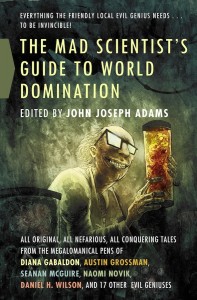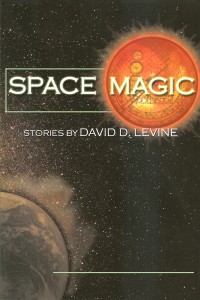Gust Post by David D. Levine
 Fantasy is, of course, an enormous genre. Definitions of fantasy vary, but the key concept that distinguishes fantasy from all other forms of fiction is the presence of at least one element that does not exist in the real world. By this broad definition, all of science fiction is a subset of fantasy, and indeed many stories usually described as horror, thriller, mystery, and even literature can be classified as fantasies of one sort or another, because they contain references to supernatural phenomena, nonexistent technologies, or impossible materials. But if you’re trying to write and sell fiction under the rubric of “fantasy,” the mere presence of a fantastic element is not enough; it needs to be integral to the story.
Fantasy is, of course, an enormous genre. Definitions of fantasy vary, but the key concept that distinguishes fantasy from all other forms of fiction is the presence of at least one element that does not exist in the real world. By this broad definition, all of science fiction is a subset of fantasy, and indeed many stories usually described as horror, thriller, mystery, and even literature can be classified as fantasies of one sort or another, because they contain references to supernatural phenomena, nonexistent technologies, or impossible materials. But if you’re trying to write and sell fiction under the rubric of “fantasy,” the mere presence of a fantastic element is not enough; it needs to be integral to the story.
If you took the fantastic element away from your story, could it still take place in fundamentally the same way? Would the characters be the same people, would they do the same things, would they have the same priorities? If so, then many fantasy readers would say that the story is not really a fantasy. You need to think through the implications of the fantastic element and consider how its presence would affect every person, thing, and event in the story.
Even a well-integrated fantastic element is still not sufficient, though: the story also must have a fantasy “flavor” — by which I mean its vocabulary, diction, tone, pace, and conventions of character and plot. However, because fantasy is such a large genre, it contains many distinct subgenres, each of which has a flavor of its own. Epic fantasies, for example, are painted on a large canvas; they typically have a large number of point-of-view characters and very high stakes. The setting is often medieval or pseudo-medieval and the prose, both dialogue and description, may be somewhat archaic and flowery. Urban fantasy, on the other hand, is gritty and personal. The setting and language are typically contemporary and, even if the fate of the world is at stake, the characters’ personal issues take center stage. (These descriptions are crude and exaggerated, of course; a successful epic or urban fantasy is far more sophisticated than this sort of two-sentence sketch can convey.)
The various subgenres of fantasy do share a few characteristics. All fantasy readers, I would say, expect and desire the extraordinary in their fiction. They want not only the well-drawn characters, coherent plots, strong emotions, vivid descriptions, and insight into the human condition they could get from non-fantastic literature, they also want a “sense of wonder” — an experience of something outside the mundane world. This is often provided by highly evocative descriptions of the story’s fantastic elements, whether they are settings, characters, or ideas. But “evocative” need not mean “overblown” — a few carefully-chosen but commonplace words can provide as much of a sense of magic and mystery as a paragraph of purple prose.
One common tool in the fantasy writer’s toolbox is “imaginary gardens with real toads in them.” If, early in the story, you describe the character’s world (whether fantastic or mundane) with sufficient carefully-chosen telling details that the reader can easily and thoroughly envision it, you create a sense of trust in the reader that will then pay off when you later introduce a fantastic element. The reader must believe in the laboratory before she will believe in the monster that emerges from it.
Fantasy readers today generally expect fairly tight control of point of view (PoV), with a limited number of PoV characters and crisply demarcated PoV shifts. The more fluid PoV used in many romance stories will be derided by fantasy readers as “head-hopping.” Also, though some non-fantasy readers sneer at cliché fantasy’s apostrophe-laden names and other invented words, the fact is that fantasy readers expect the story’s voice and vocabulary to convey some of its otherworldly feeling.
Of course, genres can be mixed. Bookstores have shelf after shelf of fantastic mystery, science-fictional horror, and romantic fantasy. But very few stories are equally successful in more than one genre at a time. There’s a difference between a romance story with fantastic elements and a fantasy story with romantic elements; a story that tries to be both at once will probably not completely satisfy habitual readers of either.
So what’s the difference? The key, in my opinion, lies in the story’s climax. What matters most to the characters? What is the most important problem that they have to solve? What is the event which brings the story to a resolution? The answers to these questions determine the story’s core genre. Even if the characters realize their love for each other at the very same moment they save the world, one of these will matter much more than the other to the characters and the reader, and that fact determines whether the story is a fantasy or a romance.
It may seem that I’m being flip here, but I’m not. A successful climax is the culmination of every other element of the story. Every event, description, and character decision in the story contributes to it directly or indirectly; even a completely separate subplot helps to lead up to the main plot’s climax by reinforcing, echoing, or contrasting with the main plot. If the relative importance of the romantic and fantastic elements of the climax is unclear or muddled, or if that relative importance doesn’t match the relative importance of the romantic and fantastic elements in the rest of the story, the reader will likely be dissatisfied with the story as a whole. (If the story lacks a distinct climax at all, it is probably experimental, literary, or magical realism rather than fantasy. Is magical realism fantasy? Better critics than I are still arguing that one.)
To write and sell a fantasy, you need to be familiar with the fantasy subgenre in which you are working. Read widely and deeply in your field, so that you can be aware of the trends and tropes your editors and readers are already familiar with. You don’t want to repeat an already-too-common formula, but you also don’t want to stray too far from the reader’s expectations without meaning to. Truly unique stories, which defy conventions and expectations, can become breakout smash hits, but they often fail to sell or find an audience. If you’re going to break the mold, you need to understand exactly what you are breaking and why.
***
 David D. Levine is the author of over fifty published science fiction and fantasy stories. His work has
David D. Levine is the author of over fifty published science fiction and fantasy stories. His work has  appeared in markets including Asimov’s, Analog, F&SF, and Realms of Fantasy and has won or been nominated for awards including the Hugo, Nebula, Sturgeon, and Campbell. He lives in Portland, Oregon with his wife Kate Yule, with whom he co-edits the fanzine Bento. His award-winning short story collection Space Magic is now available as an ebook from all the major ebook stores, and his web page can be found at http://www.daviddlevine.com.
appeared in markets including Asimov’s, Analog, F&SF, and Realms of Fantasy and has won or been nominated for awards including the Hugo, Nebula, Sturgeon, and Campbell. He lives in Portland, Oregon with his wife Kate Yule, with whom he co-edits the fanzine Bento. His award-winning short story collection Space Magic is now available as an ebook from all the major ebook stores, and his web page can be found at http://www.daviddlevine.com.
